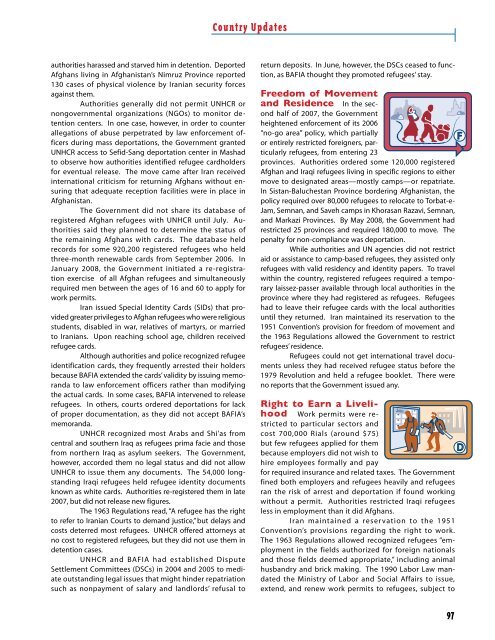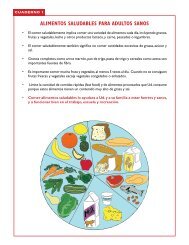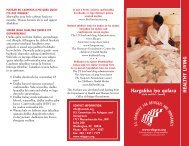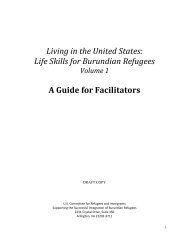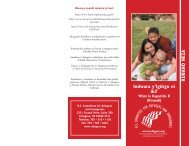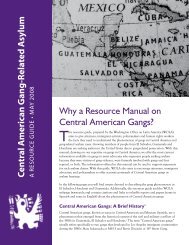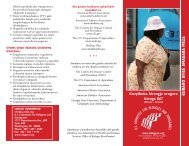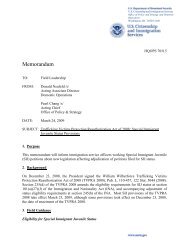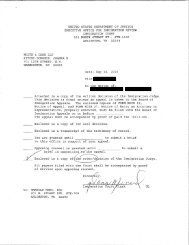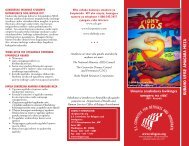Refugees and Asylum Seekers
Refugees and Asylum Seekers
Refugees and Asylum Seekers
You also want an ePaper? Increase the reach of your titles
YUMPU automatically turns print PDFs into web optimized ePapers that Google loves.
authorities harassed <strong>and</strong> starved him in detention. Deported<br />
Afghans living in Afghanistan’s Nimruz Province reported<br />
130 cases of physical violence by Iranian security forces<br />
against them.<br />
Authorities generally did not permit UNHCR or<br />
nongovernmental organizations (NGOs) to monitor detention<br />
centers. In one case, however, in order to counter<br />
allegations of abuse perpetrated by law enforcement officers<br />
during mass deportations, the Government granted<br />
UNHCR access to Sefid-Sang deportation center in Mashad<br />
to observe how authorities identified refugee cardholders<br />
for eventual release. The move came after Iran received<br />
international criticism for returning Afghans without ensuring<br />
that adequate reception facilities were in place in<br />
Afghanistan.<br />
The Government did not share its database of<br />
registered Afghan refugees with UNHCR until July. Authorities<br />
said they planned to determine the status of<br />
the remaining Afghans with cards. The database held<br />
records for some 920,200 registered refugees who held<br />
three-month renewable cards from September 2006. In<br />
January 2008, the Government initiated a re-registration<br />
exercise of all Afghan refugees <strong>and</strong> simultaneously<br />
required men between the ages of 16 <strong>and</strong> 60 to apply for<br />
work permits.<br />
Iran issued Special Identity Cards (SIDs) that provided<br />
greater privileges to Afghan refugees who were religious<br />
students, disabled in war, relatives of martyrs, or married<br />
to Iranians. Upon reaching school age, children received<br />
refugee cards.<br />
Although authorities <strong>and</strong> police recognized refugee<br />
identification cards, they frequently arrested their holders<br />
because BAFIA extended the cards’ validity by issuing memor<strong>and</strong>a<br />
to law enforcement officers rather than modifying<br />
the actual cards. In some cases, BAFIA intervened to release<br />
refugees. In others, courts ordered deportations for lack<br />
of proper documentation, as they did not accept BAFIA’s<br />
memor<strong>and</strong>a.<br />
UNHCR recognized most Arabs <strong>and</strong> Shi’as from<br />
central <strong>and</strong> southern Iraq as refugees prima facie <strong>and</strong> those<br />
from northern Iraq as asylum seekers. The Government,<br />
however, accorded them no legal status <strong>and</strong> did not allow<br />
UNHCR to issue them any documents. The 54,000 longst<strong>and</strong>ing<br />
Iraqi refugees held refugee identity documents<br />
known as white cards. Authorities re-registered them in late<br />
2007, but did not release new figures.<br />
The 1963 Regulations read, “A refugee has the right<br />
to refer to Iranian Courts to dem<strong>and</strong> justice,” but delays <strong>and</strong><br />
costs deterred most refugees. UNHCR offered attorneys at<br />
no cost to registered refugees, but they did not use them in<br />
detention cases.<br />
UNHCR <strong>and</strong> BAFIA had established Dispute<br />
Settlement Committees (DSCs) in 2004 <strong>and</strong> 2005 to mediate<br />
outst<strong>and</strong>ing legal issues that might hinder repatriation<br />
such as nonpayment of salary <strong>and</strong> l<strong>and</strong>lords’ refusal to<br />
return deposits. In June, however, the DSCs ceased to function,<br />
as BAFIA thought they promoted refugees’ stay.<br />
Freedom of Movement<br />
<strong>and</strong> Residence In the second<br />
half of 2007, the Government<br />
heightened enforcement of its 2006<br />
“no-go area” policy, which partially<br />
or entirely restricted foreigners, particularly<br />
refugees, from entering 23<br />
provinces. Authorities ordered some 120,000 registered<br />
Afghan <strong>and</strong> Iraqi refugees living in specific regions to either<br />
move to designated areas—mostly camps—or repatriate.<br />
In Sistan-Baluchestan Province bordering Afghanistan, the<br />
policy required over 80,000 refugees to relocate to Torbat-e-<br />
Jam, Semnan, <strong>and</strong> Saveh camps in Khorasan Razavi, Semnan,<br />
<strong>and</strong> Markazi Provinces. By May 2008, the Government had<br />
restricted 25 provinces <strong>and</strong> required 180,000 to move. The<br />
penalty for non-compliance was deportation.<br />
While authorities <strong>and</strong> UN agencies did not restrict<br />
aid or assistance to camp-based refugees, they assisted only<br />
refugees with valid residency <strong>and</strong> identity papers. To travel<br />
within the country, registered refugees required a temporary<br />
laissez-passer available through local authorities in the<br />
province where they had registered as refugees. <strong>Refugees</strong><br />
had to leave their refugee cards with the local authorities<br />
until they returned. Iran maintained its reservation to the<br />
1951 Convention’s provision for freedom of movement <strong>and</strong><br />
the 1963 Regulations allowed the Government to restrict<br />
refugees’ residence.<br />
<strong>Refugees</strong> could not get international travel documents<br />
unless they had received refugee status before the<br />
1979 Revolution <strong>and</strong> held a refugee booklet. There were<br />
no reports that the Government issued any.<br />
Right to Earn a Livelihood<br />
Work permits were restricted<br />
to particular sectors <strong>and</strong><br />
cost 700,000 Rials (around $75)<br />
but few refugees applied for them<br />
because employers did not wish to<br />
hire employees formally <strong>and</strong> pay<br />
for required insurance <strong>and</strong> related taxes. The Government<br />
fined both employers <strong>and</strong> refugees heavily <strong>and</strong> refugees<br />
ran the risk of arrest <strong>and</strong> deportation if found working<br />
without a permit. Authorities restricted Iraqi refugees<br />
less in employment than it did Afghans.<br />
Iran maintained a reser vation to the 1951<br />
Convention’s provisions regarding the right to work.<br />
The 1963 Regulations allowed recognized refugees “employment<br />
in the fields authorized for foreign nationals<br />
<strong>and</strong> those fields deemed appropriate,” including animal<br />
husb<strong>and</strong>ry <strong>and</strong> brick making. The 1990 Labor Law m<strong>and</strong>ated<br />
the Ministry of Labor <strong>and</strong> Social Affairs to issue,<br />
extend, <strong>and</strong> renew work permits to refugees, subject to<br />
Jobs<br />
F<br />
D<br />
97


